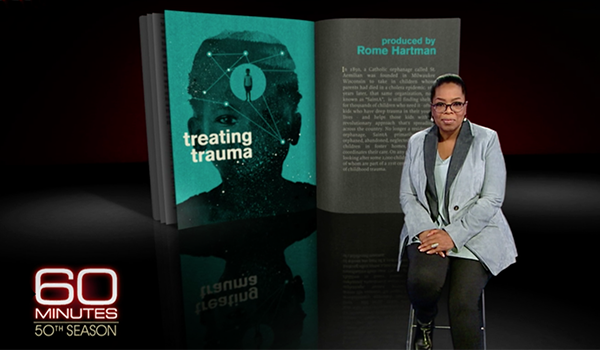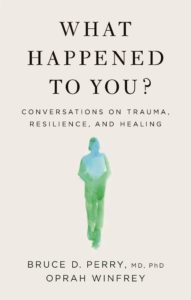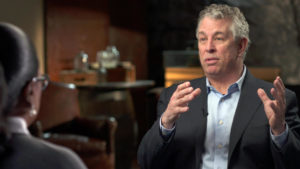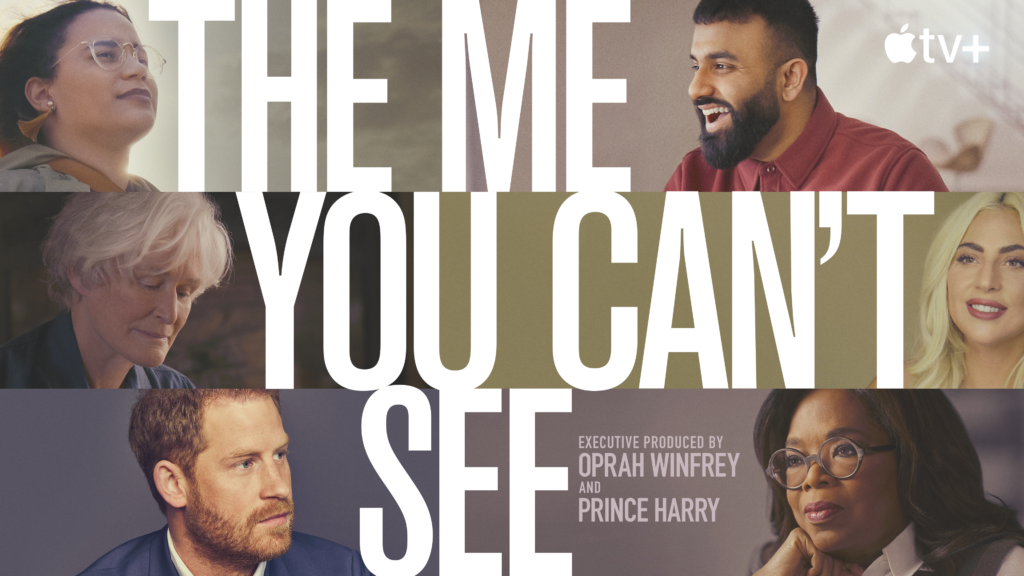Oprah Winfrey Examines Childhood Trauma and How to Treat It

*Photo credit: 60 Minutes
In the United States, an epidemic has been sweeping across the nation, being passed down from generation to generation and contributing to some of the worst health and social problems in society. Milwaukee, Wisconsin is one of the poorest cities in the nation. When a local newspaper ran a series about the city’s haunting prevalence of childhood trauma, a very well-known former resident decided to investigate further with a 60 Minutes report called Treating Childhood Trauma.
Learn about the 5 things every child needs for good mental health here!
This report on childhood trauma was so life-altering for Oprah Winfrey that she changed the way she interacted with people and operated her business and school. Oprah claims it is the most impactful story she has ever reported on, and this is reflected in two of her most recent projects.
Oprah and Dr. Bruce Perry Release Book on Childhood Trauma
 The best-selling book, “What Happened to You? Conversations on Trauma, Resilience, and Healing” by Oprah Winfrey and renowned brain development and trauma expert Dr. Bruce Perry provides an expansive discussion about childhood trauma and the long-term impact on physical, mental, social and behavioral health. It also focuses on how positive connections promote healing.
The best-selling book, “What Happened to You? Conversations on Trauma, Resilience, and Healing” by Oprah Winfrey and renowned brain development and trauma expert Dr. Bruce Perry provides an expansive discussion about childhood trauma and the long-term impact on physical, mental, social and behavioral health. It also focuses on how positive connections promote healing.
Winfrey grew up in Milwaukee, and her childhood was full of traumatic experiences. She endured years of neglect, as well as physical and sexual abuse. Her family was poor and received welfare benefits. Dr. Perry, who has studied the effects of childhood trauma on the brain for more than 30 years, says that negative experiences such as these are what derail childhood development and wire a child’s brain differently, increasing the risk for physical, mental, social and behavioral health problems.
Poverty of relationship can disrupt normal development, influence how the brain works, put you at risk for physical and mental health problems. It’s absolutely not good for you. Especially for children.
– Dr. Bruce Perry
Overcoming Adverse Childhood Experiences
The idea that childhood trauma is a predictor of later-life health and wellbeing is not a theory; it is a proven scientific fact. The Adverse Childhood Experiences (ACE) Study was the largest investigation conducted that revealed this link. Participants answered 10 questions about their childhood and current health and behaviors to determine their score. The higher the ACE score, the higher the risk for problems. You can take this test to find your ACE score.
The ACE Study has driven many organizations, schools and communities to integrate trauma-informed care into their programs and treatment systems. This revolutionary approach has changed the fundamental question from “what’s wrong with you?” to “what happened to you?” According to Perry, “it is crucial to understand what has happened to traumatized children before trying to ‘fix’ their behavior.” The purpose is to change the conversation to promote empathy and understanding, which can then lead to healing.
Overcoming childhood trauma and living a healthy, successful life is entirely possible. The key is to ensure children have positive adults in their lives who can buffer those negative experiences. According to Dr. Perry, “Connectedness has the power to counterbalance adversity.” For Oprah, her school teachers provided the love and connection she needed to feel valued. “Mrs. Duncan and Mr. Graham made me feel like I mattered,” she says.
Prince Harry and Oprah Release New Series on Mental Health
Another of Winfrey’s recent projects to shine a light on trauma and healing can now be streamed on your laptop or tv. Shortly after she interviewed the Duke and Duchess of Sussex (Prince Harry and Meghan Markle), the three announced a partnership. Their new documentary series, “The Me You Can’t See” is the first project from their collaboration and is streaming on Apple+ TV.
In one of the episodes, Prince Harry speaks candidly to Oprah about the very public childhood trauma of losing his “mum,” Princess Diana, when he was just 12 years old. He shared his experience with panic attacks and severe anxiety, and that he turned to drugs and alcohol to help dull his pain. He is hopeful that his openness and vulnerability will inspire others to seek help when needed.
It was a case of: You need to go back to the past, go back to the point of trauma, deal with it, process it, and then move forward.
– Prince Harry, Duke of Sussex
The stories featured in this series take an up-close and personal look at how people’s lives have been impacted by mental illness and the steps they are taking to heal. Oprah and Harry aren’t the only famous faces you’ll see as Lady Gaga, Glenn Close and others open up to share about their personal mental health challenges. When asked what she hoped people will learn from this series, Oprah stated that “I’m hoping people find themselves in every story: in the faces, in the feelings, in the vulnerability and the openness and the willingness to share and understand that we’re all on the spectrum of mental health. And I’m hoping people have a lot of Aha’s.”
Connection is the Path to Healing Childhood Trauma
We all want to feel valued and seen. And we all need to experience positive connection. For Winfrey, it was a bond with special teachers in her life that inspired, encouraged and made her feel safe. “It’s my teachers that saved me,” Oprah shares tearfully in her new series. “For so many years in my life that’s the only place I ever really felt loved.”
These positive connections and interactions with supportive people help promote healing from negative, traumatic experiences. Dr. Perry states “Your connectedness to other people is so key to buffering any current stressor—and to healing from past trauma. Being with people who are present, supportive, and nurturing. Belonging.” Being connected to family, history, culture and our communities can improve our overall health.
Connection builds resilience, and resilience helps create post-traumatic wisdom, and that wisdom leads to hope. Hope for you and hope for others witnessing and participating in your healing, hope for your community.
– Dr. Bruce Perry
There is hope for each of us who have experienced trauma in our past, and each of us can help children and others in our communities feel safe and connected. There are so many ways to do it – read below for a few ideas.
Click to watch Oprah’s 60 Minutes report Treating Childhood Trauma and read our blog to learn more about building a healthy brain.
If you’re interested in being a positive, buffering influence for children or teens who have been removed from their homes due to neglect, abuse and other family challenges, learn about becoming a foster parent.
Children and youth need strong tools for good mental health. Download our guide, “5 Things Every Child Needs for Good Mental Health” to learn more.







